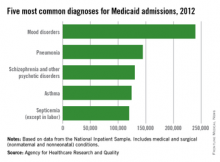Mood disorders were the most common diagnosis for Medicaid-insured hospitalizations not involving neonatal or maternal stays in 2012, according to a report from the Agency for Healthcare Research and Quality.
Of the nearly 4 million Medicaid-insured hospitalizations, mood disorders were the primary diagnosis in about 239,000 cases, or just over 6%. Pneumonia was the second most common diagnosis, accounting for 145,000 cases. Schizophrenia and other psychoses were next with 130,000 cases, followed by asthma and septicemia, with 124,000 and 120,000 cases, respectively, according to the AHRQ.
Of the 10 most common diagnoses for Medicaid hospitalizations, 6 diseases are classified as ambulatory care sensitive conditions (ACSCs); that is, conditions that should not require hospitalization if properly treated outside a hospital, such as pneumonia, asthma, diabetes mellitus, epilepsy, acute bronchitis, and chronic obstructive pulmonary disease. Only pneumonia was in the 10 most common diagnoses for hospitalization of both uninsured and privately insured patients, and diabetes mellitus was the third most common cause of hospitalization among the uninsured. Although ACSCs accounted for almost 16% of Medicaid hospitalizations, they accounted for 6% of uninsured hospitalizations and less than 3% of privately insured hospitalizations, the report noted.
The remaining four common diagnoses for Medicaid hospitalizations include mood disorders, schizophrenia, septicemia, and skin infections. Of these, mood disorders, septicemia, and skin infections are common diagnoses for uninsured and privately insured hospitalizations. Schizophrenia and other psychotic disorders were a very common diagnosis for Medicaid-insured hospitalizations but not for uninsured patients or those who were privately insured, perhaps indicating a strength of Medicaid at getting schizophrenic patients into hospitals.
The AHRQ report used data collected by the National Inpatient Sample.


